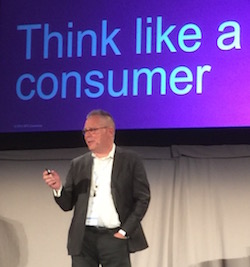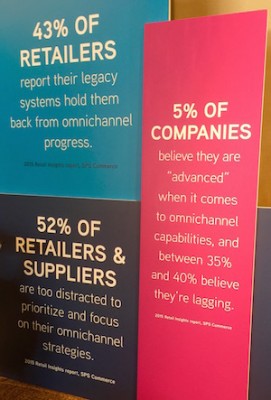 Retailers still don’t appear to be facing the profound changes their industry is undergoing, according to Peter Zaballos, VP of marketing and product at Minneapolis’ SPS Commerce, in a keynote he gave yesterday at the company’s annual “omnichannel” conference, called In:fluence15.
Retailers still don’t appear to be facing the profound changes their industry is undergoing, according to Peter Zaballos, VP of marketing and product at Minneapolis’ SPS Commerce, in a keynote he gave yesterday at the company’s annual “omnichannel” conference, called In:fluence15.
“It’s not just about ‘the Amazon effect’,” he said. “It’s about digital engagement.” He noted that, although ecommerce today totals $300 billion, a 10% slice of the overall $3 trillion of retail spending, that’s far from  the whole picture. “The real story is that 50% of total retail purchases are influenced by the web.” He said retailers need to be creating digital experiences that bring consumers into the store. “Digital influence is $1.4 trillion of retailing!” Zaballos declared.
the whole picture. “The real story is that 50% of total retail purchases are influenced by the web.” He said retailers need to be creating digital experiences that bring consumers into the store. “Digital influence is $1.4 trillion of retailing!” Zaballos declared.
He cited other surprising findings published in the company’s 2015 Retail Insights Report. (Some shown below in one of my photos from the event.) The one stat that really amazed him, however, was that 52% of those surveyed gave “Other” as their reason for not making progress in omnichannel strategies. “Are you kidding me — what is that?” Zaballos asked, questioning where retailers priorities should be. He concludes that “Other” must really be about distractions. One fact he feels contributes to that is a need for better technology practices. For example, “the retail industry is still relying on spreadsheets, a 30-year old technology” — one prone to inaccuracies, of course, with so many people often working on a given file.
 Some other surprising facts Zaballos cited from recent research findings:
Some other surprising facts Zaballos cited from recent research findings:
• Consumers spend 76% more in store when they’re engaged on mobile.
• And 49% of online purchases today begin on Pinterest.
Nearing the end of his keynote, Zaballos spoke about “item-centric architecture,” a key focus for SPS Commerce. (More on that here.) “The item is the new foundation,” he said. “We’re reinventing everything in retail around that,” noting that it’s been three years since SPS Commerce began this initiative.
He challenged the audience of retailers by saying they need to:
• Prioritize and focus on omnichannel strategies.
• Collaborate with partners. “Ask yourself, who can help me with this?”
• And just get started, “when you find that thing that is most broken.”
Zaballos closed his keynote by saying, “We’re at the beginning of a 10-year transformation. This is the year the industry goes beyond ‘Other’.”
Concurrent with the conference, SPS Commerce made two news announcements. In the first, the company unveiled the SPS Commerce Platform, a cloud-based offering that offers a more agile and collaborative foundation for critical omnichannel solutions, including analytics, assortment, fulfillment, and sourcing. More than 400 global partners have teamed with SPS to deliver value-added solutions using the SPS Commerce Platform. In the second announcement, it introduced an offering called Collaboration Analytics, which delivers accessible, responsive, and intuitive analytics powering the collaborative decision-making required to meet consumers’ expectations.